
Damal Krishnaswamy Pattammal, popularly known as D. K. Pattammal or DKP, was an Indian Carnatic musician and a playback singer for film songs in Tamil. Pattammal, along with her contemporaries M. S. Subbulakshmi and M. L. Vasanthakumari, are popularly referred to as the female trinity of Carnatic Music. This trio initiated the entry of women into mainstream Carnatic Music. She has been appreciated all over the world by Carnatic music lovers.

Amma Nanna O Tamila Ammayi is a 2003 Indian Telugu-language sports drama film directed by Puri Jagannadh. The film stars Ravi Teja, Jayasudha, Asin Thottumkal, and Prakash Raj, while Ali, and Subbaraju play supporting roles. The film released on 19 April 2003.
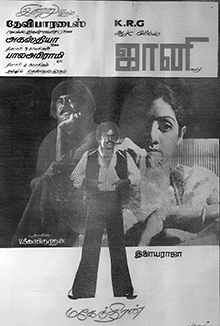
Johnny is a 1980 Indian Tamil-language crime thriller film written and directed by Mahendran. The film stars Rajinikanth, Sridevi and Deepa. Featuring Rajinikanth in a dual role, it revolves around the eponymous con artist who is implicated for a crime committed by Vidyasagar, a lookalike barber.
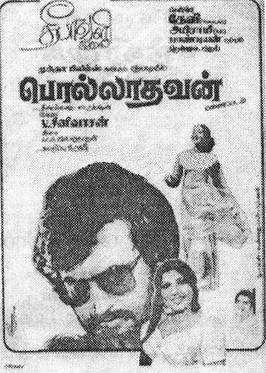
Polladhavan is a 1980 Indian Tamil-language action thriller film produced by S. Ravi, written and directed by his father Muktha Srinivasan. A remake of the 1976 Kannada film Premada Kanike, it stars Rajinikanth, Lakshmi and Sripriya. The film revolves around a wealthy merchant who keeps his daughter's nanny, an eyewitness to a murder committed by him, captive in his house.
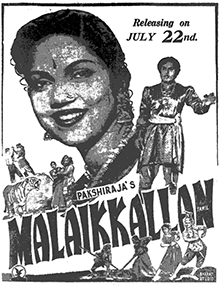
Malaikkallan is a 1954 Indian Tamil-language action film starring P. Bhanumathi and M. G. Ramachandran. The film was released on 22 July 1954, and was an astounding success and highest collection of the year. It ran more than 140 days in Chennai and all other major cities. It was the first Tamil film to win a President's Silver Medal. It was the first Indian movie to be remade in five other languages.
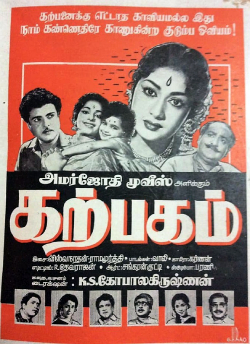
Karpagam is a 1963 Indian Tamil-language drama film written and directed by K. S. Gopalakrishnan. The film features an ensemble cast including Gemini Ganesan, Savitri, S. V. Ranga Rao, M. R. Radha, R. Muthuraman, V. K. Ramasamy, V. Nagayya, Karikol Raju, Sheeladevi, K. R. Vijaya and Baby Shakila. In Karpagam, a rich farmer makes his newly married daughter (Vijaya) and her husband (Ganesan) live in his house to take care of his business. Problems arise when his estranged son (Muthuraman) starts to squander his money.

Sila Nerangalil Sila Manithargal is a 1977 Indian Tamil-language romantic drama film directed by A. Bhimsingh and written by Jayakanthan. Based on Jayakanthan's novel of the same name, it stars Lakshmi and Srikanth, with C. K. Nagesh, Y. G. Parthasarathy, R. Neelakantan, Sukumari and S. Sundari Bai in supporting roles. The film revolves around a girl from an orthodox family whose life changes after a one-night stand.
Thiripurasundari Srinivasan, better known by her pen name Lakshmi, was an Indian writer from Tamil Nadu.

Apoorva Sagodharargal is a 1949 Indian Tamil-language action film directed by Acharya. The film which was adapted from Alexandre Dumas' 1844 novella The Corsican Brothers stars M. K. Radha and P. Bhanumathi, with Nagendra Rao and Suryaprabha playing supporting roles. It revolves around the two lookalike brothers who were separated during childhood by their cruel uncle who murdered his parents, rest of the film shows how two brothers join together in avenging the death of their parents.

Jeevitham is a 1950 Indian Telugu-language social guidance film produced by A. V. Meiyappan with his company AVM Productions and directed by M. V. Raman. The film stars Vyjayanthimala in her Telugu cinema debut with S. Varalakshmi, T. R. Ramachandran and C. H. Narayana Rao forming an ensemble cast, with many actors appearing in other significant roles. Actresses Lalitha and Padmini made guest appearances as stage dancers.
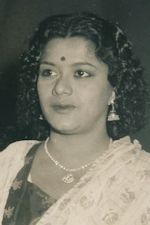
Lalitha was an Indian actress and dancer. She was the eldest of the "Travancore Sisters"—Lalitha, Padmini, and Ragini. She started her acting career in the 1948 Tamil film Adhithan Kanavu and has acted in movies of different Indian languages including Hindi, Malayalam, Tamil and Telugu. She entered films before her sisters, concentrating more on Malayalam films, and was mostly cast in vamp roles.

Thillana Mohanambal is a 1968 Indian Tamil-language period musical drama film written, directed and produced by A. P. Nagarajan. The film stars Sivaji Ganesan, Padmini and T. S. Balaiah, with A. V. M. Rajan, Nagesh and Manorama in supporting roles. It tells the story of Shanmugasundaram, a nadaswaram player who falls in love with Mohanambal, a Bharatanatyam dancer who reciprocates his feelings, but unfortunate circumstances and their egoistic nature prevents them from confessing their love for one another. How they overcome their self-created obstacles and those created by the people around them forms the rest of the story.

Kuzhandaiyum Deivamum is a 1965 Indian Tamil-language children's film directed by Krishnan–Panju. It is based on the American film The Parent Trap (1961) which in turn was based on Erich Kästner's 1949 German novel Lisa and Lottie. The film stars Jaishankar and Jamuna, with Nagesh, Sundarrajan, G. Varalakshmi, Santha, Kutty Padmini, M. S. S. Bhagayam and V. R. Thilagam in supporting roles. It tells the story of twin sisters attempting to reunite their separated parents.
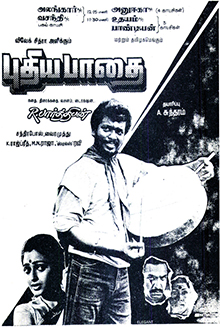
Pudhea Paadhai is a 1989 Indian Tamil-language drama film written and directed by R. Parthiban in his directorial debut. The film stars Parthiban as an inhumane ruffian who gets reformed by his rape victim (Seetha), while V. K. Ramasamy, Manorama, Nassar, Sridhar, Kuyili and Sathyapriya appear in supporting roles.
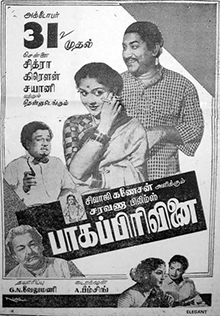
Bhaaga Pirivinai is a 1959 Indian Tamil-language drama film directed by A. Bhimsingh, starring Sivaji Ganesan, M. R. Radha and B. Saroja Devi. The film was released on 31 October 1959. It was remade in Hindi as Khandan (1965), in Telugu as Kalasi Vunte Kaladu Sukham (1961), in Kannada as Muriyada Mane (1964), and in Malayalam as Nirakudam (1977).
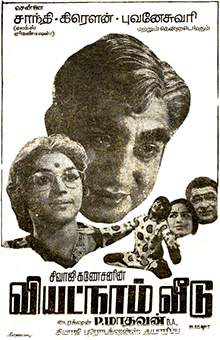
Vietnam Veedu is a 1970 Indian Tamil-language drama film, directed by P. Madhavan and written by Sundaram. The film stars Sivaji Ganesan and Padmini, with Nagesh, K. A. Thangavelu, Srikanth, M. Bhanumathi and Rama Prabha in supporting roles. Produced by Sivaji Productions, it is based on Sundaram's play of the same name. The film was released on 11 April 1970 and became a commercial success. It won the Tamil Nadu State Film Award for Best Film. The film was remade in Telugu as Vintha Samsaram (1971).
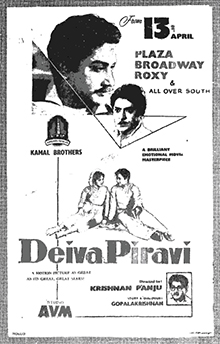
Deivapiravi is a 1960 Indian Tamil-language film, directed by Krishnan–Panju. The film stars Sivaji Ganesan, Padmini, S. S. Rajendran, K. A. Thangavelu and M. N. Rajam. The film was dubbed and released in Telugu as Anumanam and released on 24 June 1961. At the 8th National Film Awards, the film won the All India Certificate of Merit for the Third Best Feature Film. It was remade the same year in Hindi as Bindya, and in 1965 in Sinhala as Sekaya.

Vilaiyattu Pillai is a 1970 Indian Tamil-language film, directed by A. P. Nagarajan and produced by Gemini Studios. It is based on Kothamangalam Subbu's novel Rao Bahadur Singaram, which was serialised in the magazine Ananda Vikatan. The film stars Sivaji Ganesan, Padmini and Kanchana. It deals with the romance between a woman who raises a bull and a man who sets out to tame it.

Annai (transl. Mother) is a 1962 Indian Tamil-language drama film directed by Krishnan–Panju. The film stars P. Bhanumathi and Sowcar Janaki, with S. V. Ranga Rao, J. P. Chandrababu and P. Raja playing supporting roles. The plot revolves around the theme that the love of a foster mother can be even stronger than that of a biological mother.

This is the filmography of Indian actor R. S. Manohar, who performed roles ranging from hero to villain to comedic character. He acted over 300 Tamil film. He was popular for negative roles. He also played supporting roles in films with actors M. G. Ramachandran, Sivaji Ganesan, Gemini Ganesan, S. S. Rajendran, Jaishankar, Ravichandran, Sivakumar, Rajinikanth and Kamal Haasan. He is known for his versatility and dominating personality.



















